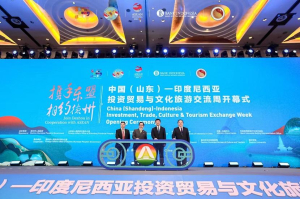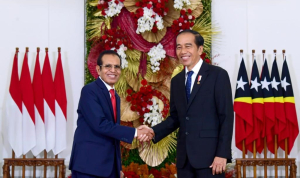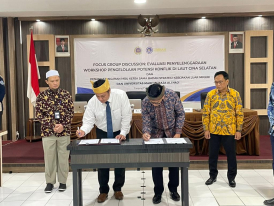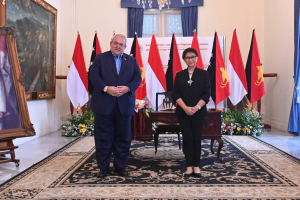Indonesia, China strengthen partnership through 4th JCBC
Chinese Foreign Minister Qin Gang met with his Indonesian counterpart Retno LP Marsudi in Jakarta on February 22, 2023, for the 4th Joint Commission for Bilateral Cooperation (JCBC) and discussed on various topics, particularly on trade and investment as well as the South China Sea.
Indonesia and China have maintained a Comprehensive Strategic Partnership for a decade. During the G20 Summit in Bali in November 2022, President Joko "Jokowi" Widodo and Chinese President Xi Jinping came to an agreement on an action plan to reinforce this partnership.
Bilateral key issues
This was the first JCBC meeting since 2018, which took place in Beijing. During this year's meeting, Indonesia focused on several topics, including:
- Enhancing trade collaboration
China is currently the largest trading partner of Indonesia. The trade relationship between the two nations has become more equitable. According to the Ministry of Foreign Affairs website, in 2022, Indonesia's trade with China hit a new record of US$ 133.65 billion, with a significant reduction of trade deficit on the Indonesian side.
"During the meeting, I specifically conveyed a request that various trade barriers be overcome," Marsudi told a joint press briefing.
- Boosting investment collaboration
In the 2022's last quarter, China emerged as the largest investor in Indonesia. Addressing this matter, Marsudi emphasized the importance of utilizing Indonesia's workforce, protecting the environment and promoting high-quality environmentally friendly investment.
Infrastructure cooperation between the two nations was also a topic of discussion during the meeting.
"Indonesia will continue to improve the investment climate by taking into account the interests of the Indonesian people," she said.
- Collaboration in health sector
Marsudi noted that Indonesia and China had effectively cooperated in responding to the COVID-19 pandemic. She highlighted the lesson learned from the pandemic, stressing the importance for every country to enhance their health infrastructure, including their pharmaceutical industry.
Indonesia recognizes the significance of reinforcing collaboration in the following areas:
- Carrying out joint research and development initiatives in vaccines and genomics
- Enhancing the production capacity of medicinal raw materials, particularly BBO (medicinal raw materials)
- Fulfilling commitments on sister hospital partnerships and establishing herbal centers in Indonesia.
- Collaboration on enhancing connectivity and promoting people-to-people contacts
Marsudi emphasized that post-COVID-19, an essential aspect that needs immediate attention is the issue of connectivity. Improved connectivity will help expedite the recovery of economic and societal relationships.
Therefore, she said, Indonesia has been pushing for the restoration of connectivity with China. Indonesia also welcomes the return of Chinese tourists.
Regional and global issues
In addition to discussing bilateral issues, both foreign ministers also deliberated various regional and global matters that were of priority to both countries.
Marsudi conveyed that Indonesia and ASEAN had a very high interest in maintaining Southeast Asia as a peaceful and stable region as well as a center of economic growth.
The issue of Myanmar was also brought up and discussed. Indonesia expressed gratitude for China's endorsement of the 5-Point Consensus. “As the current ASEAN Chair, Indonesia is committed to engaging with all parties involved in Myanmar to facilitate an opportunity for conducting an all-encompassing national dialogue in the country,” she said.
As part of implementing the ASEAN Outlook on the Indo-Pacific (AOIP), Indonesia will host the ASEAN Indo-Pacific Forum, which will involve discussions on enhancing infrastructure cooperation and an Investment Summit.
Indonesia highly values China's involvement in realizing the AOIP. Indonesia also desires the South China Sea to be a tranquil and secure region.
China's positive response
During the joint press conference, Minister Qin expressed his delight in attending the JCBC meeting. He affirmed that China and Indonesia would continue to collaborate in addressing global challenges, including those related to politics, economics and the relationship between citizens of the two nations.
He highlighted that China would fully support Indonesia's role as a leader of ASEAN in 2023 and would persist in supporting the independence and importance of ASEAN.
"A New Cold War from the competition of big countries must not happen in our region, the Asia Pacific. Countries in this region must not take a stance supporting one side. We hope and believe that Indonesia and other ASEAN countries will maintain peace and regional stability and express independent judgment and voice," Qin Gang said in the joint press briefing.
The minister also mentioned that China aimed to further improve its trade and investment partnership with Indonesia. He highlighted that Chinese investment in Indonesia increased by 160% in 2022 to reach US$ 8.23 billion.
"Both countries will deepen the strategic relationship, by accelerating the development of flagship BRI (Belt and Road Initiative) cooperation projects, such as the Jakarta-Bandung High-speed Train (KCJB) and ensure the project will be completed and operate on time," Qin Gang said.
"We will also continue to work together to promote the construction of projects such as the Regional Comprehensive Economic Corridor, and the Two Countries Twin Parks, and creating benchmarks for BRI's joint development high quality," he added.
Qin Gang also stressed that China would keep encouraging its investors to enhance their investment in Indonesia.
Already have an account? Sign In
-
Start reading
Freemium
-
Monthly Subscription
30% OFF$26.03
$37.19/MonthCancel anytime
This offer is open to all new subscribers!
Subscribe now -
Yearly Subscription
33% OFF$228.13
$340.5/YearCancel anytime
This offer is open to all new subscribers!
Subscribe now






